
June 24, 2021
HARRISBURG, June 24, 2021— The Pennsylvania Senate today unanimously approved a bill by Sen. Jim Brewster aimed at helping veterans and others in recovery by waiving license fees for recreational fishing.
Senate Bill 241, introduced by Brewster in February, will exempt the cost of fishing licenses in Pennsylvania for veterans and other individuals taking steps towards physical or mental recovery as part of therapeutic recreation events or programs.
“Fishing, like all outdoor recreation, is healthy fun, healthy for the economy and we now know that it can be an important part of the health of thousands of Pennsylvanians trying to overcome challenges,” Brewster said. “I’m looking forward to seeing hundreds of events across Pennsylvania that provide opportunities for recreational and therapeutic angling.”
The bill would provide for a dedicated exemption for individuals participating in therapeutic angling programs sponsored by various established service groups, such as Project Healing Waters and Wounded Warriors.
The Pennsylvania Fish and Boat Commission estimated that in 2018, more than 60 different service organizations and hundreds of unique one-day fishing opportunity events across the Commonwealth would have qualified for exemption under the provisions of Brewster’s bill.
The bill now goes to the House.

June 21, 2021
Harrisburg, Pa. – June 21, 2021 − After Republicans failed to pass a clean, bipartisan bill to extend mixed drinks to go for restaurants and taverns, the Pennsylvania Senate Democrats are introducing legislation that will provide the opportunity for bars, taverns and restaurants to extend some of the emergency provisions of the disaster declaration.
Under leadership of the Senate Democrats, the General Assembly passed statutes that permitted restaurants to sell mixed drinks to go, sell alcohol outside in contiguous areas, expand off premise catering permits, and receive other waivers and discounts on fees, which we were under the protections of a disaster declaration.
When Republicans ended the disaster declaration with a concurrent resolution in early June, they did nothing to prepare for restaurants to continue these activities – despite knowing the hospitality industry would be harmed.
“The Senate Democratic Caucus is fighting to help the hospitality industry recover from the past year of hardship,” said Senate Democratic Leader Jay Costa. “And we’re hopeful that the Senate Republicans will join us – instead of capitalizing on the pain of the small business community.”
Instead of passing House Bill 1154, which enjoyed bipartisan support in the House and Senate, Senate Republicans added a political amendment to privatize our liquor system – with no hearings or expert testimony.
“Republicans continue to politicize the tragedy of the COVID-19 pandemic, and frankly I think Pennsylvanians are fed up of their talking points,” said Senator Wayne D. Fontana. “They campaigned hard to end the disaster declaration and misled folks on what that meant. Many restrictions were already ended, but their hasty and partisan end to the declaration is hurting small business owners.”
Members of the Senate Democratic Caucus will introduce amendments and a new bill to permanently enshrine the permissions granted under the COVID-19 disaster declaration, without tying this aid to partisan tricks.
The amendments will continue the following emergency permissions:
- Mixed drinks to go
- Ability to sell in contiguous areas outside of the licensed premises
- Increase in the wholesale discount from 10% to 15%
- Allow an unlimited number of off premise catering permits
- Waive safekeeping fees
- Ability for closing restaurants and taverns to sell their liquor inventory to other liquor licensees
“Since July of last year, I have been asking my Republican colleagues to support these measures,” said Senator Jim Brewster. “I keep hearing from restaurants and taverns in my district that they want these things to continue. They’re tired of excuses from Harrisburg; there’s no reason we can’t get this done for them.”
“The hospitality industry has been decimated over the past 15 months, and this immense hardship transcends all party lines and allegiances. Workers and small businesses are still reeling from the pandemic and need, and deserve, our support,” said Senator Nikil Saval. “These amendments will benefit people and communities throughout our Commonwealth that these businesses sustain, and simultaneously allow for the continued reimagining of how residents get to experience our streets and communal spaces.”
These amendments are in addition to the New Deal for Pennsylvania plan that the caucus put forth in May, which includes $2.47 billion in spending of the state’s allocation from the American Rescue Plan for people-focused recovery, including business assistance, job training and workforce development.
More information on the New Deal proposal can be found at pasenate.com/newdeal
Previously, the Senate Democrats fought for and secured $145 million in assistance for the hospitality industry in the form of grants in January of 2021, paid for with federal funding from the CARES Act.
###

June 10, 2021
McKEESPORT, June 10, 2021 – In a letter sent to top officials this week, state Sen. Jim Brewster urged the Pennsylvania State System of Higher Education (PASSHE) to pause its plans to consolidate system universities to allow more careful and deliberate consideration of the long-term impact.
Brewster is calling for a two-year delay in implementation of the board’s controversial plan to integrate six universities into two to address its financial challenges.
In his letter to Board Chair Cynthia Shapira and Chancellor Dan Greenstein, Brewster said a consolidation “in haste” during the recovery from a global pandemic, could present unforeseen consequences.
“The decision to significantly reorganize how our universities provide education at these institutions should not be done without a great deal of discussion with all stakeholders,” Brewster wrote. “It also should not be considered without fully understanding that actions in haste will have long-lasting deleterious effects or be on the agenda of policymakers in the immediate aftermath of a debilitating pandemic.”
At the same time, Brewster said, a delay would give the General Assembly, now sitting on a $3 billion budget surplus and $7.3 billion in federal pandemic aid, an opportunity to respond to the “wake-up call” that the consolidation plan provided.
“The potential application of new federal resources, in concert with heightened state support may provide a path for bold and progressive action that does not involve consolidation/mergers,” he wrote. “In addition, I believe the merger — as discussed — should serve as a wake-up call for the General Assembly to end years of neglect. It creates a platform for lawmakers to work with our partners at the federal level to make the investment needed in affordable higher education.”
PASHHE is now in the middle of its public comment period over the plans. Citizens can comment by clicking here.
The entire contents of Brewster’s letter can be read here.
###
PASSHE Consolidation-Merger Letter
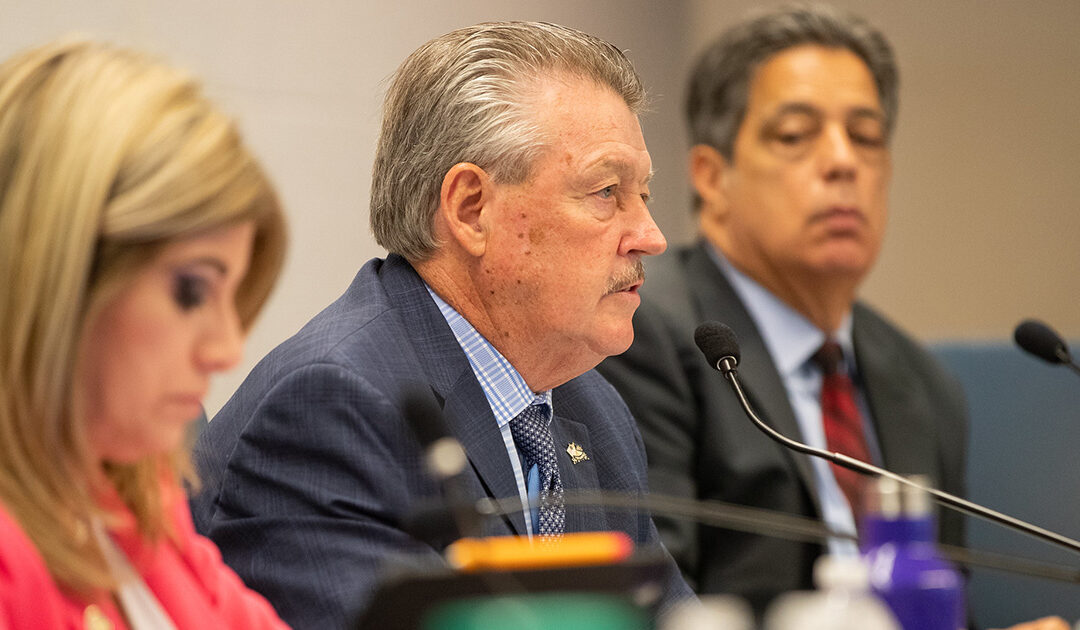
June 1, 2021
Harrisburg – June 1, 2021 – At the request of state Senator Jim Brewster (D- Allegheny/Westmoreland), the Pennsylvania Senate Democratic Policy Committee held a hybrid in person and virtual public hearing to discuss the Mon Fayette Expressway and what this project will mean to the southwest region of Pennsylvania.
“The investment into the Mon Fayette Expressway is not just about building another road, it is very important to understand that what we are doing here is building for the future,” Senator Brewster said. “The Mon Fayette Expressway is crucial in revitalizing the Mon Valley and providing direct and indirect access to family sustaining jobs for generations to come. We must provide this project with the resources that it needs to be completed.”
According to TRIP, a national transportation research group, improving the efficiency of a region’s transportation system by expanding the capacity of highways, transit and intermodal facilities has been shown to enhance economic development opportunities and improve quality of life.
Maury Burgwin, President of the Mon Yough Chamber of Commerce, said that his organization fully supports the Mon Fayette Expressway calling it, “The single most important economic development issue for our region is completion of Mon-Fayette from Route 51 to Interstate 376.”
“The approved route for the expressway north from RT 51 in Large, PA will provide direct highway access to 1600 manufacturing and related firms that employ over 22,000 people,” Burgwin continued.
TRIP research also shows that for every $1 million spent on urban highway or intermodal expansion, an average of 7.2 local, long-term jobs were created at nearby locations as a result of improved access.
The Federal Highway Administration estimates that each dollar spent on road, highway and bridge improvements results in an average benefit of $5.20 in the form of reduced vehicle maintenance costs, reduced delays, reduced fuel consumption, improved safety, reduced road and bridge maintenance costs and reduced emissions as a result of improved traffic flow.
Darrin Kelly, President of the Allegheny County Labor Council, said that his organization is fully supportive of the Mon Fayette Expressway, and they see this project as a continued opportunity to work with the business community of the region, coordinate with the federal government on lifechanging infrastructure improvements for Western Pennsylvania, and to provide long-term family sustaining jobs.
“Jobs in the industry average around $80,000 to $90,000 and that includes great benefits and pensions,” Kelly said.
Thomas Melisko, President, IUOE Local 66 said that with other projects in the region coming to a close, the opportunity for skilled union labor to be utilized in the building, completion, and maintenance of the Mon Fayette Expressway is an excellent opportunity for his union’s almost 8,000 members.
In his testimony, Mark Compton, CEO of the Pennsylvania Turnpike, said that Pennsylvania Act 89 has been instrumental in the allowing projects like the Mon Fayette Expressway to come to fruition.
Brad Heigel, Chief Engineer of the Pennsylvania Turnpike, discussed the need for forward thinking when it comes to the projects like the Mon Fayette Expressway. He said that he has been working with the University of Pittsburgh to analyze the need for electric charging stations along state roads as well as the possibility of electrified roads that will one day charge vehicles as they drive. Heigel also spoke about the need to maintain community engagement and properly inform residents of the construction that will be taking place as part of the Mon Fayette Expressway.
“No one should be blocked from economic opportunity, growth, or prosperity because of where they live. Adequate and well-maintained infrastructure that serves the needs of populations is essential to a successful economy. The Mon Fayette Expressway is an excellent example of building back better and providing resources and opportunity to every Pennsylvanian,” Sen. Katie Muth (D- Berks/Chester/Montgomery), chair of the Senate Democratic Policy Committee, said.
Below are all who participated in today’s hearing:
- Mark Compton, CEO, Pennsylvania Turnpike
- Brad Heigel, Chief Engineer, Pennsylvania Turnpike
- Darrin Kelly, President, Allegheny County Labor Council
- Thomas Melisko, President, IUOE Local 66
- Sean Logan, President, Monroeville Area Chamber of Commerce
- Maury Burgwin, President, Mon Yough Chamber of Commerce
Senators who attended this hearing in person and virtually included: Senate Democratic Leader Jay Costa (D- Allegheny), as well as Senators Sharif Street (D- Philadelphia), Wayne D. Fontana (D- Allegheny), Lindsey Williams (Allegheny), Tim Kearney (D- Chester/Delaware), Maria Collett (D- Bucks/Montgomery), and Amanda Cappelletti (D- Delaware/Montgomery).
The full recording of this roundtable, as well as the written testimony from participants, can be found at senatormuth.com/policy. A full recording of this hearing can also be found on the PA Senate Democratic Facebook page.
###

May 26, 2021
Monroeville, PA − May 26, 2021 − At the request of state Senator Jim Brewster (D- Allegheny/Westmoreland), the Pennsylvania Senate Democratic Policy Committee will hold a hybrid in person and virtual public hearing to discuss the Mon Fayette Expressway and what this project will mean to the southwest region of Pennsylvania. Testifiers at the hearing will include leaders in government, labor, and business chamber organizations.
The Senate Democratic Policy Committee is chaired by Senator Katie Muth (D-Berks/Chester/Montgomery).
WHEN: The hearing is scheduled for Tuesday, June 1, 2021, at 1 p.m.
WHERE: Monroeville Borough Building-Council Chambers & Virtual
2700 Monroeville Blvd.
Monroeville, PA 15146
The Hearing will also livestreamed at SenatorBrewster.com/Live and the PA Senate Democratic Caucus Facebook page.
You can register through Zoom here.
WHO: Sen. Jim Brewster (D- Allegheny/Westmoreland), Sen. Katie Muth (D- Berks/Chester/Montgomery), members of the PA Senate Democratic Caucus
Media coverage is welcome and encouraged.
###

May 25, 2021
HARRISBURG, May 25, 2021 – Local projects aimed at remediating blight and revitalizing local communities were awarded more than $1.3 million in state grant money today, state Sen. Jim Brewster announced.
Brewster, a former mayor of McKeesport who held a virtual public hearing in March on improving Pennsylvania’s blight remediation efforts, said the grants will help local communities fund their local efforts and stabilize neighborhoods.
The grants were approved today by the Commonwealth Financing Authority as part or their Blight Remediation Program.
“Run-down and abandoned buildings hamper local efforts to attract new residents and businesses and grow the tax base,” Brewster said. “These grants are important investments in communities that will pay dividends in the years to come.”
Among the leading beneficiaries is the City of Arnold, which was approved for a $300,000 grant to demolish 27 blighted properties as part of its Blight Remediation Plan. The money will go toward acquisition, demolition and administrative costs. Arnold has the highest building vacancy rate in Westmoreland County. The Westmoreland County Land Bank will also receive $300,000 for its overall blight remediation efforts.
The Redevelopment Authority of the City of New Kensington was approved for a $298,000 grant to rehabilitate the iconic Dattola Theater which has been closed for more than 35 years. The project will replace the roof, abate asbestos and restore structural stability to the building that local officials hope will serve as a catalyst for future “Main Street” development in the city.
The City of McKeesport will also receive nearly $300,000 to restore and rebuild properties along 5th Avenue and Shaw Avenue in the city.
Also receiving funds:
- Borough of Dravosburg – $20,000 to demolish two blighted and unsafe residential buildings.
- Borough of Wilmerding – $30,000 to demolish 10 abandoned buildings.
- Tri-COG Land Bank – $190,000 to demolish two buildings and renovate four others in six different municipalities.
- Steel Rivers Council of Governments – $30,000 to demolish 12 properties in the boroughs of Glassport and Versailles.
- Borough of Liberty – $45,000 to demolish an abandoned and unsafe school building and turn the land over for recreation.
- Borough of Elizabeth – $68,310 to demolish four abandoned buildings to pave the way for future construction.
- Borough of East Pittsburgh – $25,000 to plan for remediation of as many as 80 properties as part of a comprehensive blight plan.
For more details on other projects in the 45th District that will see state investment, click here.

April 15, 2021
McKeesport, April 15, 2021 – School organizations in the 45th Senate District will receive nearly $2 million in state grants to advance computer learning and STEM education, state Sen. Jim Brewster announced today.
The grants are among $10.8 million distributed statewide under the PAsmart Advancing Grants program aimed at boosting job readiness for Pennsylvania students.
“Most jobs at this point in the 21st century require knowledge of technologies that were unheard of in the last century,” Brewster said. “A competitive workforce is an educated workforce and I’m proud of the school organizations in my district that were able to compete for and win precious state resources.”
Projects funded by the PAsmart Advancing Grants include computer science and STEM programs in robotics and artificial intelligence; the establishment of innovative STEM partnerships between school districts and higher education partners to provide college credits and industry credentials in STEM and computer science; support for diversity and inclusion on esports teams in high-need areas; establishing innovation hubs through collaborations with community colleges, city parks, and libraries to help underserved learners build STEM and computer science skills; establishing mentorships to expose underrepresented learners to STEM careers; and opportunities for rural, urban, and suburban students to gain hands-on experience in coding and robotics.
Grant recipients in the 45th District include: Allegheny Intermediate Unit 3, Westmoreland Intermediate Unit 7, Clairton City School District, and East Allegheny School District.
For more information on grant amounts and partners, click here.
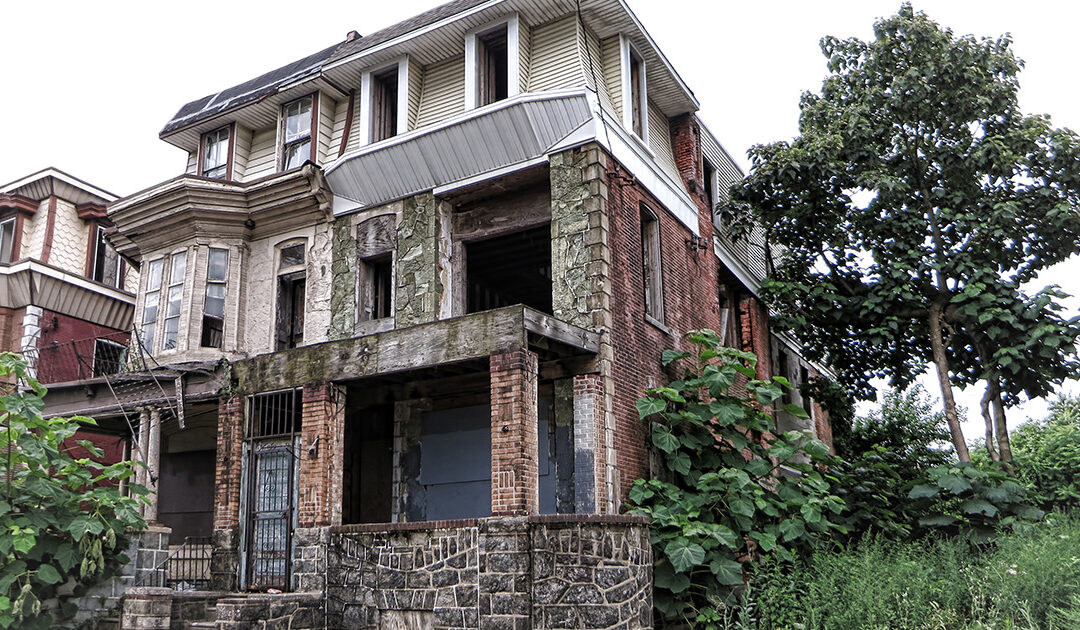
March 26, 2021
Harrisburg – March 26, 2021 – At the request of state Senators Wayne D. Fontana (D- Allegheny), Jim Brewster (D- Allegheny/Westmoreland), Lindsey Williams (D- Allegheny) and Representative Sara Innamorato (D-Allegheny), the Pennsylvania Senate and House Democratic Policy Committees held a virtual public hearing on the issues of abandoned and blighted property conservatorship, the effect of blight on neighborhoods, and tools to eradicate blight while preserving the integrity of communities.
“Making sure that blight does not continue to bring down our thriving communities is of the utmost importance,” Sen. Fontana said. “The premise of Act 135 and all blight remediation legislation are overall positive and essential to eliminating blight. The purpose of this hearing is to examine the act to make sure the law is being used for its intended purpose and make any necessary changes to achieve this goal.”
Act 135 of 2008, the Abandoned and Blighted Property Conservatorship Act, was passed in Pennsylvania to allow responsible owners to take over empty buildings that have become eyesores in neighborhoods for years. Owners are required to act under court supervision, however, there have been housing developers in recent years that have taken advantage of Act 135 cheaply acquire properties.
“I have been an advocate of this kind of blight removal legislation over the years, because run-down and abandoned buildings hamper local communities as they implement development initiatives and attract new opportunities to the area,” said Sen. Brewster. “The legislation discussed today is necessary to support community revitalization efforts and to build stability throughout the region.”
There have been many community organizations and municipalities who have used act 135 to rehabilitate blighted properties and allowed easier access to affordable home ownership to underserved communities. But there are still concerns that in rehabilitating these properties, these neighborhoods are being gentrified.
Brewster said that he expects there to be changes to Act 135 of 2008 after the testimony heard at the policy hearing today.
Ernie Hogan, Executive Director of the Pittsburgh Community Reinvestment Group (PCRG) said, “Since the passing and amendment of the legislation, there have been abuses of the law that have emerged, resulting in lost equity, lost access, and damaging speculation. Our members have told us loud and clear that many neighborhoods have seen unscrupulous investors surface with the desire to speculate and flip real estate, in some cases competing with local neighborhoods organizations.”
“Another shared theme in the tragic story of blight includes the concentration of these properties in areas of existing high poverty and low property values. Places like my neighborhood – far too long ignored by the private market and public investment alike,” Diamonte Walker, Deputy Executive Director of the Urban Redevelopment Authority (URA) of Pittsburgh, said.
“Once it gets started, this vicious cycle of abandonment and blight, leading to further abandonment and blight, is hard to stop. Not to mention that our current ability to reverse the cycle without sparking gentrification is a feat that too rarely occurs,” Walker continued.
Walker emphasized that the issue of blight does fall more heavily on communities of color, and that if the resources are not given directly to the communities that blight and devaluation of property are affecting, this issue will persist. She said that she has been working with Sen. Fontana on changes to the Municipal Claims and Tax Lien Law (MCTLL) to provide for an expedited Sherriff Sale process, currently only available to the City of Philadelphia. Legislation extending this option to Pittsburgh would dramatically enhance the ability of the City, URA, and the land bank to return vacant, abandoned, and tax delinquent property to productive use.
Winnie Branton, Founder and President of Branton Strategies, L.L.C, also spoke about the importance of land banks in Pennsylvania to combat blight and revitalize neighborhoods. A land bank is a governmental entity whose mission is to convert vacant, abandoned, and tax-delinquent properties to productive use. In Pennsylvania, a land bank operates similar to how an area housing authority would. Land banks were established in Pennsylvania by Act 153 of 2012, and there are currently 29 land banks throughout the commonwealth.
As the sergeant in charge of sheriff sales for the Allegheny County Sheriff’s Office, Gina Dascola said that her office is very happy working with the Tri-COG land bank in Allegheny County because it allows them to waive certain fees and tax liens associated with a sheriff sale of a property helps foreclosed properties get rehabilitated more quickly.
While Mandi Culhane, Shareholder with the Pittsburgh based law firm GRB Law, said that waiving tax liens is detrimental to municipalities and their finances, both Ernie Hogan of PCRG and Diamonte Walker of URA disagreed.
Hogan and Walker believe that is more beneficial to communities, and the financial situations of municipalities, to rehabilitate blighted homes and properties to make housing more affordable and get more responsible homeowners on municipal tax rolls.
Gerald Driggs, Director of the Upper Allegheny Valley Community Development Corporation (CDC) said that his organization does not even utilize blight conservatorship as it is currently written into law in Pennsylvania because his organization finds the process too complicated and too expensive.
Driggs and his CDC adopted a strategy called ‘Proactive Blight Remediation’.
“We see blight remediation as a continuum that ranges from demolition to returning a blighted building to the tax rolls while meeting community needs and priorities and creating a viable community asset,” Driggs said.
Driggs also advocated in his testimony for ‘Spot Blight Eminent Domain.’ This form of eminent domain is a tool for a municipality under very specific and regulated circumstances, to take individual properties for redevelopment or rehabilitation, and is designed to transfer blighted properties to responsible new owners in a short timeframe with limited administrative overhead.
“So many of our local municipalities struggle with cost-effective ways to manage blighted properties in a way that both improves the safety and appearance of their neighborhoods and moves these properties off of the delinquent tax rolls,” Sen. Lindsey Williams said. “Learning more about how we as legislators can effectively remove barriers and lower costs for our municipalities while balancing the rights of current property owners, if they exist, and protecting historic properties has been incredibly useful. I’m looking forward to putting this knowledge into legislative action that will help our local leaders and communities.”
“Blight conservatorship, housing equity, and making sure that the laws we have passed here in the legislature are truly serving communities is so important,” Sen. Katie Muth (D-Berks/Chester/Montgomery), chair of the Senate Policy committee, said. “I am grateful for the testifiers here today for presenting possible options on how we can improve polices to eliminate neighborhood blight while still protecting communities.”
Below are all who testified in today’s hearing:
- Ernie Hogan, Executive Director, Pittsburgh Community Reinvestment Group
- Joe Mistick, Professor, Duquesne University School of Law
- Mandi Culhane, Shareholder, GRB Law
- Judy Berkman, Senior Counsel, Regional Housing Legal Services
- Gerald Driggs, Director, Upper Allegheny Valley Community Development Corporation
- Diamonte Walker, Deputy Executive Director, Urban Redevelopment Authority of Pittsburgh
- Gina Dascola, Sergeant, Allegheny County Sheriff’s Office
- Winnie Branton, Founder and President, Branton Strategies, L.L.C
The full recording of this hearing can be found at senatormuth.com/policy or on the PA Senate Democratic Facebook.
###

March 19, 2021
Allegheny County − March 19, 2021 − At the request of state Senators Wayne D. Fontana (D- Allegheny), Jim Brewster (D- Allegheny/Westmoreland), Lindsey Williams (D- Allegheny) and Representative Sara Innamorato (D-Allegheny), the Pennsylvania Senate and House Democratic Policy Committees will hold a virtual public hearing on the issues of abandoned and blighted property conservatorship, the effect of blight on neighborhoods, and tools to eradicate it. At the hearing, experts and community representatives will discuss legislative policy solutions for this community concern.
The Senate Democratic Policy Committee is chaired by Sen. Katie Muth (D-Berks/Chester/Montgomery), and the House Democratic Policy Committee is chaired by Rep. Ryan Bizzarro (D- Erie).
The hearing is scheduled for Friday, March 26, 2021, at 10 a.m. It wil be livestreamed at SenatorMuth.com/Policy and the PA Senate Democratic Caucus Facebook page.
You can register for the Zoom here.
Media coverage is welcome and encouraged.
###
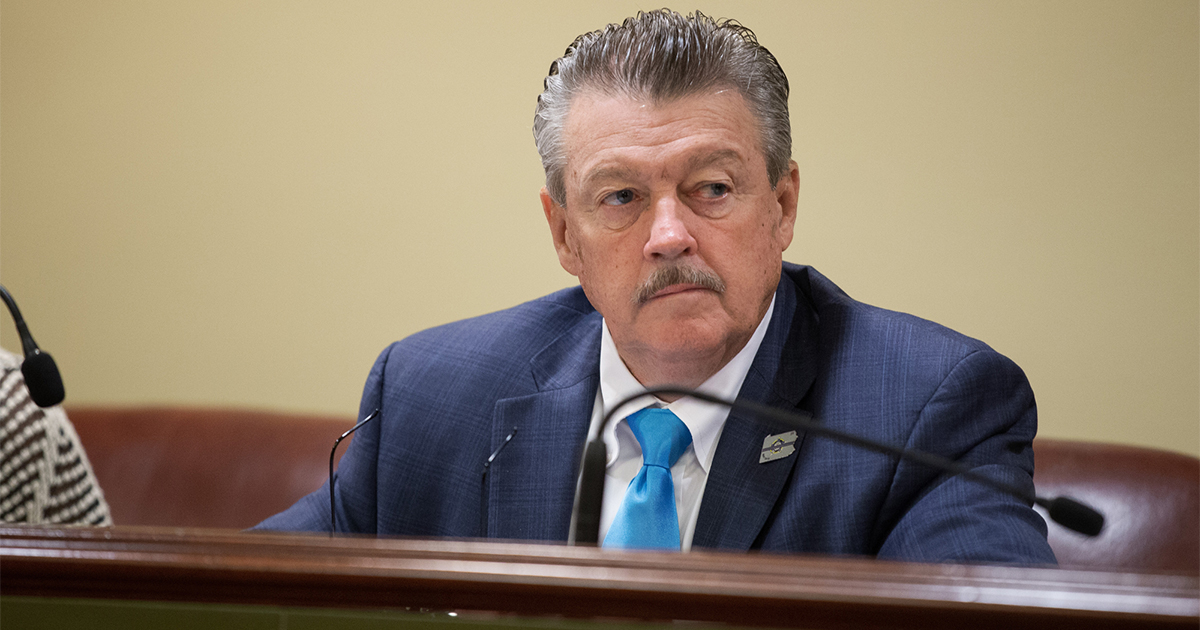
March 16, 2021
HARRISBURG, March 16, 2021 − With an eye toward bolstering trust in elected officials, state Sen. Jim Brewster announced today he has re-introduced a series of bills that will ban per diem payments, automatic pay raises, car leases, and gifts of any value for state lawmakers.
“It’s long past time to eliminate these legislative perks that have cost taxpayers millions and cost their elective representatives the public confidence that is critical to effective government,” Brewster said. “We will have tough decisions ahead as we rebuild our economy and trust has to be restored and sacrifice has to be shared.”
Brewster (D-Allegheny/Westmoreland), first introduced the reform measures in 2015, and has re-introduced them every session since.
“I think the time is ripe for some serious self-reflection in the General Assembly that will give us momentum this time,” he said.
The bills include:
SB 361 – Replaces yearly, automatic cost-of-living adjustments (COLA) by a once-per-decade raise consideration following the decennial U.S. Census and calculated by the Consumer Price Index.
SB 362 – Replaces per diem payments with reimbursement for actual expenses upon sufficient documentation.
SB 363 – Ends state vehicle leases for members of the General Assembly, instead reimbursing for actual milage and tolls for documented government travel.
SB 364 – Bans gifts of any value to members of the General Assembly. No member could solicit or accept, for their personal use or for another’s use; a gift, favor, entertainment, hospitality, loan, or any other item of monetary value.
The bills have been referred to the Senate State Government Committee.
###

March 13, 2021
McKeesport, March 13 – State Sen. Jim Brewster (D-Allegheny/Westmoreland) is encouraging Allegheny County residents who are struggling to pay rent and utilities to apply for financial assistance on Monday, March 15.
Eligible county residents will be able to apply for rent and utility assistance from the Emergency Rental Assistance Program online at https://covidrentrelief.alleghenycounty.us. The program, administered by the Allegheny County Department of Human Services, will distribute $79.9 million in federal funding to county residents who have been financially impacted by the COVID-19 pandemic. That includes those who:
- have at least one person who qualifies for unemployment, has lost income, or suffered financially due to COVID-19;
- are at risk of experiencing homelessness;
- have a total income below 80% of the Area Median Income for Allegheny County.
“There is a light at the end of the tunnel, especially as more and more people are vaccinated, but so many in our community have taken a financial hit because of the pandemic,” Brewster said. “This program can help people struggling with rent and utility payments to find a little help. I encourage anyone who needs assistance to apply for the program.”
Drop-in centers with internet access and computers will also be available across the county for those who need assistance with the application. Two of those centers will be located in Senator Brewster’s district at The Wander Building, 337 Fifth Avenue, McKeesport, and at Greater Valley Community Services, 300 Holland Avenue, Braddock.
ACTION-Housing can help with applications over the phone at 412-248-0021.
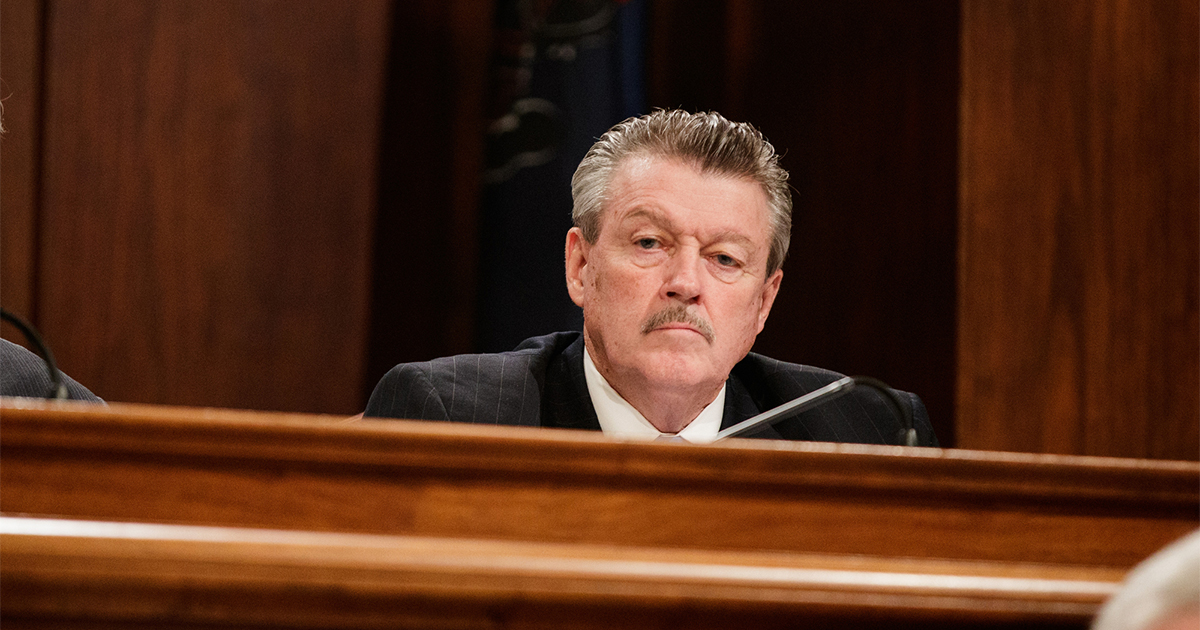
February 19, 2021
HARRISBURG – February 19, 2021 – State Sen. Vincent Hughes (D-Philadelphia/Montgomery) and Rep. Elizabeth Fiedler (D-Philadelphia) were joined by several Democratic House and Senate members from a cross Pennsylvania on Friday to call for repairs to hazardous and toxic schools across Pennsylvania.
Sen. Jim Brewster (D-Allegheny/Westmoreland), Sen. Judy Schwank (D-Berks) and Rep. Kyle Mullins (D-Lackawanna) pointed to public school buildings in their districts in desperate need of repair during the virtual press conference. The legislators spoke in support of recently unveiled proposals in the House and Senate pushing for significant investment in school infrastructure.
“Today’s event addressed conditions in schools all across the commonwealth, and make no mistake, these same hazardous and toxic conditions exist in communities represented by the Republican caucuses,” Sen. Hughes said. “Rural, suburban and urban communities alike face daunting challenges because of our aging public school buildings. We cannot wait any longer to act. I am grateful to my colleagues for their support on this legislation, as well as the awareness they are helping raise for this important issue.”
The first proposal would expand the Redevelopment Assistance Capital Program (RACP) by $1 billion to help address health hazards in public school buildings across Pennsylvania. Gov. Tom Wolf put forth the RACP proposal as a top priority in his recent 2021-22 budget address.
“Our schools were already dangerous places for students, educators and staff before the pandemic hit,” Rep. Fiedler said. “As we seek to make schools safe in the age of COVID, we are determined to also remediate the lead, asbestos and other toxins. Our coalition is powerful. Together, we are committed to investing state dollars in our public buildings and giving communities across Pennsylvania the schools they deserve!”
The second proposal would create the Public School Building Emergency Repair and Renovation Grant program, distributing grants to public schools for emergency repairs including lead and asbestos abatement or remediation, HVAC repair or replacement, electrical system repair or replacement, plumbing repair or replacement, roof and window repair or replacement and other repairs or replacements that present a health or safety issue. This proposal would rely on federal funding provided through the American Rescue Plan.
“Safe and healthy school environments are vital to the success of our students, teachers and staff,” Sen. Brewster said. “As a former educator, I know firsthand the importance of a safe environment for a student’s physical health and academic achievement. While touring schools throughout the district and discussing concerns with numerous school officials, it is evident that assistance in bringing our public school buildings up to date is a top priority. The proposals discussed this morning will give districts the opportunity to make these necessary upgrades.”
Pennsylvania has some of the oldest school buildings in the nation. Most school buildings were constructed between 1950 and 1959. More than 200 buildings constructed prior to 1950. The aging buildings pose many health hazards including lead in the drinking water; asbestos in cracked floor tiles; mold outbreaks in classrooms; broken boilers in the winter; and no air conditioning in the summer.
“Pennsylvania students’ ability to access a quality education is fundamental to our Commonwealth’s future,” Sen. Schwank said. “But how can we expect our students to learn if they are in unfit and unsafe classrooms? Too many schools were in terrible physical condition even prior to the pandemic. They should have been repaired long ago, and now we are facing a crisis. If we truly want to provide a safe environment for our students, faculty and staff these bills must be passed.“
Legislators are hopeful to gain bipartisan support for the initiative to repair schools statewide. Beyond the clear benefits in creating healthier, safer schools, they point to the potential economic impact from the jobs that would be created as a result of the infrastructure investment.
“No child’s health, safety, or the quality of their education should be safeguarded any less simply because of what school district they happen to live in,” Rep. Mullins said. “It is long overdue that state leaders finally rectify these chronic inequities across our school districts and recognize these as matters of civil rights and public health.”
In 2018, the Public School Building Construction And Reconstruction Advisory Committee released the PlanCon final report. The legislature has not funded programs to address the facilities issued raised in the PlanCon report. Conditions in many districts have worsened, and become more costly, as a result of inaction.
Click here to watch the full press event.
####
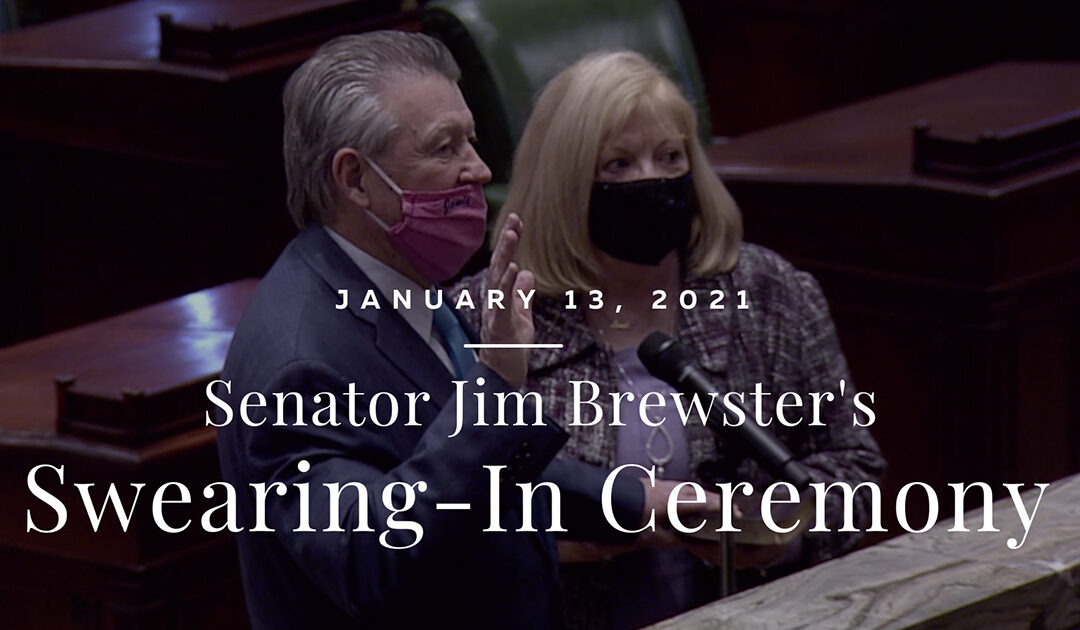
January 13, 2021
Takes oath of office today in Harrisburg ceremony
Harrisburg – January 13, 2021 – State Senator Jim Brewster (D) was sworn in today for another term in the Pennsylvania State Senate, serving constituents in portions of Allegheny and Westmoreland Counties.
“It is an honor and privilege to serve the citizens in the 38 communities that are a part of the 45th District,” Brewster said. “I will continue to pursue a broad agenda that is focused on families.
“My legislative proposals include measures to promote job creation, economic development, tax relief, education support and safety, and help for those who are in need.”
The lawmaker has also proposed plans to help small businesses and families during the COVID-19 pandemic, as well as to institute a responsible energy extraction tax on Marcellus Shale drillers and to use the revenue to fund education and environmental protection. He is also the prime sponsor of a package of bills to reform the legislature and make it more transparent, including eliminating per diems, state vehicles, and a gift ban.
Brewster was first elected to the Senate in a special election in 2010. He was re-elected in 2012, 2016, and 2020.
Brewster said there are great challenges ahead for lawmakers this session. A budget deficit and the continuing challenges from the pandemic, he said. Even amid these substantive and difficult issues, he said that there was an opportunity to address issues involving local government.
“As the former mayor of McKeesport, I know the difficulties that economically-stressed communities face,” Brewster said. “Lawmakers in Harrisburg also need to focus on addressing the problems of small cities and struggling communities across Pennsylvania.”
###

December 23, 2020
McKeesport – December 23, 2020 – Senator Jim Brewster today announced more than $6 million in state grants that will go to projects in the 45th senatorial district.
“I was happy to advocate for these important projects, and I am excited to see them come to fruition thanks to this investment from the state,” said Senator Brewster. “Each of the projects funded today will bolster our region’s economy.”
The funding comes from the Redevelopment Assistance Capital Program (RACP), a Commonwealth grant program administered by the Office of the Budget for the acquisition and construction of regional economic, cultural, civic, recreational, and historical improvement projects.
One of the projects funded will be the expansion of PurePenn in McKeesport. The medical marijuana manufacturer will receive $2,000,000 to conduct an interior build-out which will include mechanical, electrical, fire protection, and other interior building components.
“This investment in McKeesport has been a job creator and a real contributor to the regional economy”, said Brewster. “I am looking forward to what comes for the area from this substantial funding.”
Also, UPMC St. Margaret’s Family Health Center in New Kensington will receive $1,250,000 for a new clinical space to accommodate more patients, provide room for team and group meetings, and offer swing spaces for outside social service agencies.
The Greater Pittsburgh Community Food Bank will receive $1,000,000 to improve overall efficiency and support distribution of more fresh produce.
In addition to these investments, the Braddock Carnegie Library Association is slated to receive $1,000,000 to implement the first comprehensive building renovation and preservation plan in the 132-year history of the Braddock Carnegie Library.
And finally, the Former Westinghouse HQ/Pittsburgh Supercomputing Center in Monroeville will receive $1,000,000 as it moves forward with efforts to provide university, government and industrial researchers with access to systems for high-performance computing, communications, and data storage.

December 8, 2020
McKeesport – December 8, 2020 – State Senator Jim Brewster today announced the following state tax credit monies for COVID-19 relief and community development initiatives.
“I was pleased to support this initiative that will help our communities overcome some of the challenges caused by the pandemic,” Brewster said. “The dollars will also help kick-start some vital economic and community development initiatives in our neighborhoods.
Greater Pittsburgh Community Food Bank in Duquesne
- $1,435 million to serve over 260,000 people in an 11-county area in southwestern Pennsylvania. The food bank expects to distribute the equivalent of more than 35 million meals to food to struggling families this fiscal year.
Tube City Renaissance in McKeesport
- $13,500 to address blight, safe housing, quality of life and employment opportunities. The density in housing fosters greater health risks to individuals and families living in crowded apartments or rundown homes with little access to safe and adequate housing. The organization is looking to renovate a vacant home on Cornell.
Westmoreland County Action in New Kensington
- $160,000 to develop and renew downtown with community involvement and staying focused on the needs of residents. Create a temporary site for the farmers market during construction of the New Kensington Market House and Community Center, provide food/supplies and infrastructure needs for the community related to COVID, and more.
McKees Point Development Group in McKeesport
- $360,000 to stabilize housing stock and create new home ownership opportunities, by working with Rebuilding Together Pittsburgh; Rehabilitate and resize the downtown business district while creating new businesses opportunities. Maximizing the potential for job creation related to the tourism industry by targeting development toward the key historical/recreational area surrounding the Penn McKee Hotel, the Marina at McKees Point, and the Great Allegheny Passage.
Mon Valley Initiative
- $160,000 in Braddock to focus on residential stabilization. Expected to make a positive impact on over 700 low-income people in Braddock with Braddock Library’s numerous programs, adjusted for COVID-19 impacts. During the six-year plan, they will sell six newly built homes and secure financing for eight rental units.
- $380,000 in Clairton for home construction projects that are in pre-development, including the Clairton Inn, a mixed-use project with 49 residential apartments and 5 commercial spaces. Along with a focus to improve home ownership rates, provide direct health and human services, including the provision of 1,200 meals to families, connecting residents to health services, youth programming, and training residents on the use of NARCAN.
Rebuilding Together Pittsburgh
- $37,500 in McKeesport. The group’s goal is to enhance the quality of life for low-income residents through renovations allowing homeowners to remain living independently. Targeted repairs further stabilize homeownership and value of their neighborhood, enhancing the economic revitalization of McKeesport as a whole.
- $41,250 in Clairton for home repairs and neighborhood revitalization. Will serve at least nine residents, repair seven homes, retain jobs, and utilize local and minority-owned contractors as much as possible.
Administered by the state Department of Community and Economic Development, the tax credits are distributed through Neighborhood Partnership Programs.
# # #

November 20, 2020
McKeesport – November 20, 2020 – State Senator Jim Brewster today issued the following statement on the final 2020-21 state budget:
“With the dire impact of the pandemic as the backdrop, I am pleased that the legislature was able to hold the line on taxes while fully funding key programs and initiatives,” Brewster said.
The harsh economic impact from the pandemic complicated this year’s budget planning and necessitated difficult and innovative decisions, such as using over $4 billion in one-time funds and supplemental federal dollars to balance the budget.
In the year ahead, we will need to re-examine spending priorities and base projections on more reliable and continual revenue sources.
Like all budgets, there are things I agree and disagree on. While I’m pleased that we were able to maintain support for key state programs and resources without raising taxes, I’m disappointed that we were not able to free up more dollars to help front line workers, struggling business owners and unemployed workers.
It is crucial that we focus in the coming year on ways to help these workers and businesses endure until we get this horrific pandemic behind us.”
# # #

October 21, 2020
McKeesport – October 21, 2020 – State Senator Jim Brewster today announced over $40 million in state low-interest loan funds for two key local water projects.
“These state PENNVEST dollars will help these communities expedite the completion of these important projects,” Brewster said. “I will continue to seek state support for local public projects.”
According to Brewster, the projects include:
- Elizabeth Township will receive a $17.299 million loan to install a new pump station and conveyance system, including a new force main to convey sewage to an existing multi-municipal treatment center in McKeesport. Brewster said the project will addresses a 2016 Department of Environmental Protection consent order that will also reduce wet weather overflows into a nearby water source.
- Clairton Municipal Authority received a $23 million loan to install four membrane bioreactor basins, two effluent storage tanks, clarifiers and contact tanks. The project will address the system’s long-term control plan, reducing Combined Sewer Overflow bypasses, and reduce wet weather overflows into streams.
The projects wre approved by the PENNVEST board today. The funding for these projects comes from a combination of funds including: Growing Greener, Marcellus Legacy funds, federal grants to PENNVEST from the Environmental Protection Agency, and recycled loan repayments from previous PENNVEST funding awards.
Established in 1988, PENNVEST helps fund water and sewer projects statewide.
# # #

September 15, 2020
McKeesport – September 15, 2020 – Nearly $1.5 million in grant funding has been approved by the Commonwealth Financing Authority (CFA) for nine projects in the area, according to state Sen. Jim Brewster (D-Allegheny/Westmoreland).
“The ability to secure grant dollars to fund critical local projects is helpful to our municipalities and taxpayers,” Brewster said. “The nearly $1.5 million in grant funding will be used by nine communities to complete important projects that may not be possible without additional support.”
Brewster said the funding for the projects was approved through the CFA’s Gaming Economic Development and Tourism Fund Program. The fund is established to support economic development projects in Allegheny County. It is funded through gaming revenues.
The grants include:
- Greater Pittsburgh Community Food Bank in Duquesne: $100,000 grant to build new sidewalks and ramps;
- Clairton: $100,000 for the installation of safety lighting;
- Monroeville: $100,000 to help Allegheny Petroleum purchase computer equipment to outfit its new building in the municipality;
- North Versailles: $250,000 grant to add lighting upgrades to Crestas Ballfield complex;
- While Oak Borough: through Steel Rivers COG, $100,000 grant to aid in the construction of retaining walls and add to the Center Street Extension Remediation project;
- Liberty Borough: $151,250 through Steel Rives COG, to demolish Old Liberty School;
- Plum: $150,000 grant through the Turtle Creek Valley COG, to replace storm sewer pipes as a part of the Holiday Park Storm Sewer Project;
- Healthy Village Learning Institute in McKeesport: $85,501 grant to replace obsolete windows;
- Elizabeth Borough: $376,250 grant for façade upgrades, sidewalk repairs and streetscape improvements.
Brewster has a long record of success in helping to secure federal, state, county, and local funding for key projects. He said he was pleased that the grant funding was available in this round, and that additional dollars will be secured for other projects in the next funding cycle.
-30-

September 8, 2020
McKeesport – Sept. 8, 2020 – State Sen. Jim Brewster’s (D-Allegheny/Westmoreland) effort to safely increase indoor and outdoor seating for bars and restaurants moved forward today as the Senate Law and Justice Committee approved legislation to expand capacity.
Brewster supported a bill (House Bill 2513) to increase indoor occupancy and offered a revised plan to expand seating for outdoor dining. Brewster’s amendment to increase capacity for bars passed unanimously.
Earlier this year, he wrote a letter to the governor seeking state regulatory permission for bars and restaurants to safely reopen with additional seating.
“Since the COVID-19 pandemic struck, I have been trying to make sure that our economy can reopen safely, including increasing capacity for bars and restaurants,” Brewster said. “The committee action today to increase capacity, in addition the announcement by the governor to ease restrictions, will help restaurants, bars and the hospitality industry.
Restaurants have been hit particularly hard by seating restrictions and have sought ways to safely reopen with expanded capacity.
Just prior to the committee’s action, the governor announced that he was easing restrictions on restaurants. The governor said that restaurants can increase their indoor occupancy to 50 percent beginning Sept. 21.
Brewster, who serves as Democratic chair of the Law and Justice Committee, has been a strong and forceful advocate for protecting workers and patrons while reopening the economy in the face of the pandemic.
In July, along with his colleague, Sen. Pam Iovino (D-Allegheny/Washington), Brewster offered plan to use $100 million in federal pandemic recovery funds to help restaurants and bars impacted by forced closures.
Earlier this year, the lawmaker outlined a six-point economic stimulus plan to help workers and small businesses and he detailed a safe reopening strategy for area businesses that protected workers and consumers.

September 4, 2020
McKeesport – Sept. 4, 2020 – Decisions on whether to restart interscholastic fall sports should be left to local school district officials, state Sen. Jim Brewster (D-Allegheny/Westmoreland) said today following his vote in support a bill that would leave it to school boards to decide.
“The legislation makes it clear that local school boards will make that decision — as long as health and safety protocols are in place,” Brewster said.
Brewster voted for House Bill 2787 in the Senate Education Committee on Friday for the second time following a reconsideration of Thursday’s vote. The committee voted 10 to 1 in favor of the bill, which will now be reported to the full Senate.
“The legislation enjoys strong and wide support and should be quickly passed by the full Senate,” Brewster said. “We need to give local officials discretion to make decisions once safety protections are established.”
Brewster serves on the statewide School Safety and Security Committee. In June, the committee recommended a framework to distribute more than $150 million in federal pandemic relief funds to school districts across the state. The funding was earmarked to help schools deal with COVID-19 expenses.
“We have distributed funding to local schools to help defray costs, but more needs to be done,” Brewster said. “These funds and the approval of bills to give local school districts discretion on reopening strategies and school sports are key aspects of the recovery.”
Brewster said school directors get input each day from parents, school administrators and others on reopening school sports and are well positioned to make that decision.
The McKeesport lawmaker has been recognized as a leader on boosting the economy and safely reopening in the wake of the coronavirus pandemic.
In March, Brewster offered a six-point economic stimulus plan to quickly regain jobs and spur a quick recovery from COVID-19. In April, he detailed a health and safety strategy to ensure that a rapid, but safe reopening, featuring more testing and protections for workers.

August 27, 2020
Harrisburg, PA – August 27, 2020 – Today, State Senators Iovino, Street, Brewster, Schwank, and Hughes joined members of the Commonwealth’s small business community via Zoom to advocate for bipartisan legislation that would help Pennsylvania businesses file claims on their business interruption insurance policies, a potential source of funds that could help prevent businesses from being forced to close their doors. Business interruption insurance is coverage that replaces income lost in the event that business is halted due to a disaster. Since the pandemic and resulting shutdown, many Pennsylvania small businesses have sought financial relief by filing claims on their business interruption insurance policies, only to be denied due to ambiguous insurance policy language.
“To confront the most daunting economic challenge of our time, we need to put in place every available option to provide safety nets and recovery tools to support our businesses and our economy – and that includes business interruption insurance,” said Senator Pam Iovino (D – Allegheny & Washington). “Businesses that have consistently paid their business interruption insurance premiums expect their insurance coverage to provide security during a time of need. They need to know that a lifeline they planned for is available and within reach, and this bipartisan bill would do just that.”
Senator Iovino’s legislation, Senate Bill 1127, is designed to clarify Pennsylvania law and specifically applies to businesses with business interruption coverage that contains a “civil authority” clause. These clauses provide protections when government action, typically taken in response to a natural disaster or similar life-threatening event, prevents the business from operating. The Pennsylvania Supreme Court has characterized the pandemic as a “natural disaster and a catastrophe of massive proportions.” Also, the legislation would clarify that the presence of COVID-19 in a community constitutes “property damage.”
Under this legislation, businesses would not receive additional payment beyond what their existing coverage permits. Insurance companies would not be mandated to immediately pay claims – the normal claims review process would take place before any payments are made.
Senate Bill 1127 was referred to the Senate Banking and Insurance Committee on April 30. The next step in the legislative process would be a Senate hearing.
“The economic damage caused by the pandemic is something our communities have never faced,” said Senator Sharif Street (D – Philadelphia). Small businesses are the foundation of economic ecosystems throughout communities in the Commonwealth, we must do all we can to sustain them. As Democratic Chair of the Banking & Insurance committee I am committed to working with Chairman Scavello (R) to convene a hearing pending growing reports of businesses across communities having their insurance claims denied. This bill will ensure that we protect the small businesses that drive our economy which have been interrupted through no fault of their own. I’m proud to join Senator Iovino, a leader in this bipartisan effort. “
“Businesses that have paid insurance premiums to financially protect themselves when there is an interruption in operations – such as when the coronavirus pandemic struck – shouldn’t have to struggle when a claim is made,” said Senator Jim Brewster (D – Allegheny & Westmoreland). “Entrepreneurs and small business owners rely on insurance to cover these types of situations.
Covering losses from situations beyond the control of businesses is exactly why you buy and pay for insurance. There should be no problems when operations are suspended and claims are filed.”
Lori Poe, who co-owns The Tandem Connection Bike & Running Shop in Washington County with her husband, said “if we were able to get some reimbursement from our insurance company for the business interruptions and loss of our second store, it would help us stay above water in the winter months when we are typically very slow. We appreciate Senator Iovino, her staff, and other legislators going to bat for the small businesses in our area.”
“As President/CEO of the Pittsburgh Airport Area Chamber of Commerce, one of the largest regional chambers in the Commonwealth, I feel compelled to advocate and to support legislation that is specifically designed to add a ‘lifeline’ to our small business community devastated by the pandemic,” said Chris Heck. “Financial relief should not be denied to those due to ambivalent insurance policy language. We support Senate Bill 1127, introduced by our PA Senator, Pam Iovino.”
“There’s no doubt about it – small businesses in Pennsylvania are suffering,” Senator Judy Schwank (D – Berks) said. “These businesses, which have done everything we’ve asked of them, should not be further penalized by their insurance carriers because of vague language.”
Jack Goodrich, a Pittsburgh attorney who specializes in business interruption insurance claims, said that “all we want to do is protect the small business owners that are the backbone of this country. They paid their premiums for years and deserve compensation now for their business losses through no fault of their own.”
“Small businesses all across Pennsylvania are bearing an undue share of the economic collapse caused by the coronavirus pandemic,” said state Senator Vincent Hughes (D – Philadelphia & Montgomery). “Taking action on business interruption insurance is a must. We should be providing every option possible to help their survival and recovery because they are the backbone of our economy.”
A downloadable video of today’s virtual press conference can be accessed here.
###

August 25, 2020
McKeesport – August 25, 2020 – State Sen. Jim Brewster’s (D-Allegheny/Westmoreland) call for legislative reforms including a ban on gifts for lawmakers was endorsed today by Gov. Tom Wolf.
Wolf unveiled his governmental reform and broader issue agenda for the fall and the gift ban was included among items cited by the governor. Brewster has called for the gift ban in addition to eliminating taxpayer-funded legislative per diems and car leases.
“Several years ago, I authored a package of legislative reforms including a ban on gifts for lawmakers — plus the elimination of per diems and car leases –because I thought it was the right thing to do to protect taxpayers,” Brewster said. “My effort to push these reforms forward has been well received by taxpayers in my district and throughout the state.
“The fact that the governor renewed his call for legislative reform will hopefully give my legislation the push it needs to ultimately become law.”
Brewster first introduced the reform package in the 2015-16 Senate session. His bill to ban legislative gifts was re-introduced this session as Senate Bill 646. Brewster’s bill to end legislative per diems for lawmakers is Senate Bill 644, and his proposal to do away with taxpayer-funded car leases is Senate Bill 645.
“I have been a staunch advocate for these reforms for years,” Brewster said. “Removing the access to gifts and per diems will help make government more transparent and accountable.”
Brewster said he looks forward to debating his reform proposals when the General Assembly reconvenes in September.
-30-
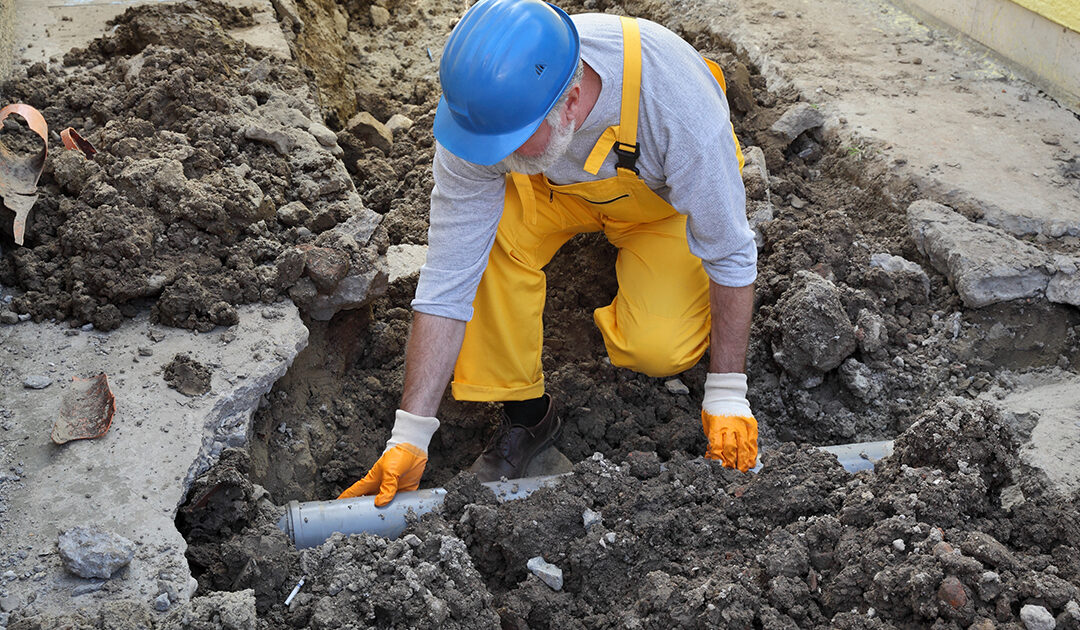
August 19, 2020
McKeesport – August 19, 2020 – More than $3.7 million in state grant funding for water and sewer projects was approved for municipalities in Allegheny and Westmoreland Counties, state Sen. Jim Brewster (D-Allegheny/Westmoreland) said.
The Commonwealth Financing Authority (CFA) approved grants for 16 projects in Brewster’s district through their Small Water and Sewer and H2O programs. All told, there were 11 grants in Allegheny and five in Westmoreland.
“Securing resources from the state to pay for water and sewer upgrades is critical to improving service delivery and reducing local taxpayer burdens,” Brewster said. “These funds will help complete essential projects.”
Small Water and Sewer Program projects include:
Allegheny County –
- Liberty Borough ($200,000) River Road Pump Station improvements
- Turtle Creek Borough ($229,250) Combined sewer rehabilitation
- West Mifflin ($116,268) Duquesne Avenue Culvert Replacement Project
- Monroeville Municipal Authority ($422,675) Sanitary sewer rehabilitation Woodhaven Drive
- North Versailles Township Sewer Authority ($146,942) Star Alley Lane Street sanitary sewer replacement
- Braddock ($250,000) Sewer system deficiency repairs
Westmoreland County –
- Arnold ($69,023) 14th Street outfall
- Lower Burrell ($132,352) Craigdell Road stormwater repairs
- Municipal Authority New Kensington ($148,360) Waterline replacement
- Parks Township Municipal Authority – Allegheny Township ($90,950) Water line replacement
H2O Program grants include:
Allegheny County –
- Duquesne ($500,000) Water system improvements
- Clairton Municipal Authority ($200,000) Phase II, wastewater treatment project
- Monroeville Municipal Authority ($300,000) Woodhaven Drive sanitary sewer Phase 2
- North Versailles Township Sanitary Sewer Authority ($200,000) Crestas Pump Station improvements
- Turtle Creek Maintenance Project ($100,000) Flood protection, sediment removal
Westmoreland –
- Arnold ($600,000) Combined sewer separation
Brewster, who served as mayor and on council in McKeesport prior to being elected as senator, said that it was important for local municipalities to seek state funding and that he was pleased communities throughout his district received funding in this round of CFA grants.
-30-

August 10, 2020
Statewide, Pa. – August 10, 2020 – The Pennsylvania CDFI Network and the PA State Senator Democrats today announced $96 million in grant awards under the COVID-19 Relief Pennsylvania Statewide Small Business AssistanStatewide, Pa. – August 10, 2020 – The Pennsylvania CDFI Network and the PA State Senator Democrats today announced $96 million in grant awards under the COVID-19 Relief Pennsylvania Statewide Small Business Assistance program. The small businesses that have been approved for awards span all 67 Pennsylvania counties.ce program. The small businesses that have been approved for awards span all 67 Pennsylvania counties.
“These grants and the relief they will provide are testament to what we can do when we prioritize the right initiatives,” said Sen. Vincent Hughes (D-Philadelphia/Montgomery). “It is because of collaboration and a collective focus that today we were able to deliver help to the auto body shops, the barbershops, the beauticians, the pizza shop owners, the soul food establishments and other businesses across the commonwealth. And though we are gathering today virtually to recognize the positive impact these grants will have, it is critical to understand that there is still a great deal of need and must continue to direct resources and aid to our small business community to help it recover from the devastation of the pandemic.”
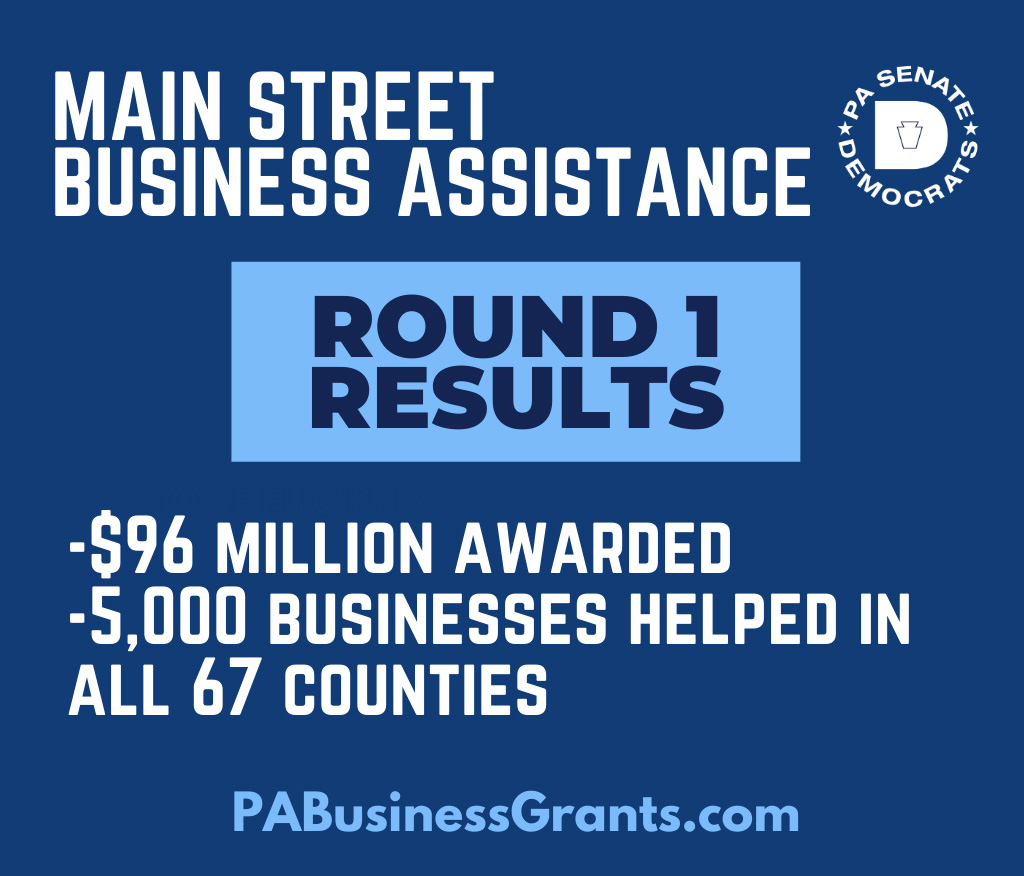 The program is part of $225 million in statewide relief championed by the senate democratic caucus in June to support small businesses economically impacted by the pandemic. The first application round drew a strong response with nearly 24,000 applications.
The program is part of $225 million in statewide relief championed by the senate democratic caucus in June to support small businesses economically impacted by the pandemic. The first application round drew a strong response with nearly 24,000 applications.
“We’ve seen the impact of this pandemic-fueled economic crisis on the small businesses in our communities and in the immense response to the program in the first round of applications,” said Daniel Betancourt, President & CEO of Community First Fund and Chair of the PA CDFI Network. “The PA CDFI Network is grateful for the partnership of Governor Wolf and the Pennsylvania Legislature as we move quickly to get these resources into the hands of those most impacted by the crisis.”
Of the close to 5,000 small businesses approved in the first round of funding, 50% are historically disadvantaged businesses that have traditionally experienced discrimination when seeking financial services and financial products. Over 2,400 of the businesses are also in communities targeted for business investment by state government programs like Main Street and Elm Street.
“I could not be more proud or more grateful for the great work of DCED and Pennsylvania’s CDFI Network in delivering substantive, fair, equitable, need-based assistance to our state’s main street and historically disadvantaged small businesses. Our program design and the accountability it provides to taxpayers and to our federal funders is a model for the nation,” Senator Blake (D-Lackawanna) said. “I appeal to the US Congress and to our colleagues on both sides of the aisle in Harrisburg to recognize the success of this program in assisting small businesses devastated by the pandemic and to invest further in the program so we can help even more of them.”
The program has targeted getting grants to small businesses with the greatest need and to be eligible to apply businesses had to have less than $1M in revenue and less than 25 employees. Grants ranged in size from $5,000 to $50,000 based on the revenue size of the business. More than 2,300 of the grantee business owners are low-moderate income.
“Our business community has been severely impacted by the COVID-19 pandemic and is in need of immediate assistance. The grant program is targeted to help small businesses manage costs, handle expenses, and stay in operation in this exceptionally difficult time,” said Senator Brewster (D-Allegheny). “Since COVID struck our state and debilitated our business community, I have been advocating for bridge grants and sought millions in aid for impacted businesses and workers. The small business assistance grants are one of the tools we can use to bolster business, maintain jobs and help workers at a time of immense distress.”
More than two thirds of the approved awardees are women-owned businesses and 16 percent located in rural communities. The businesses represent industries that have been especially hard hit by the pandemic including retail, food and hospitality, health and wellness, and personal care.
| Industry |
Applications Approved |
Amount (Millions) |
| Restaurants & Other Eating Places |
1,608 |
$25.80
|
| Drinking Places (Alcoholic Beverages) |
202 |
$4.63
|
| Personal Care Services |
1,001 |
$24.52
|
| Other Amusement and Rec. Industries |
180 |
$3.46
|
| Totals |
2,991 |
$58.41
|
“For minority and women-owned businesses in Pennsylvania COVID-19 didn’t create a crisis, it laid bare the crisis our minority entrepreneurs have been facing for decades,” House Democratic Finance Committee Chairman Jake Wheatley Jr (D-Allegheny) said. “While I’m glad to see the positive impact of these grants and I urge all local community businesses to apply for the next round of grants, we need to expand investment in programs like this because it’s long past time for the legislature to address the systemic flaws that are leaving too many marginalized people behind.”
The second grant application window for the relief funds opened today, August 10, and will remain open for 15 business days closing at 11:59PM on August 28.
“Our small business owners need our help and support,” said state Rep. Carolyn Comitta, D-Chester. “After limited or even no sales due to the virus for almost five months, it would be unfair to let them suffer alone without any intervention. These grants give our small businesses hope and, I am here with my democratic colleagues to provide them whatever help they need to address this pandemic. Our business owners, their employees, and their families deserve our assistance.”
In order to get funds to businesses in need as quickly as possible, the second application window will be the final opportunity to apply for the program. Qualified applicants not awarded in the first round do not need to reapply and will be rolled into the next round for consideration.
Eligible small businesses can apply online at pabusinessgrants.com or through any one of the 17 Community Development Financial Institutions (CDFIs) that are part of the Pennsylvania CDFI Network.
Summary_Round1
###
About the PA CDFI Network
The PA CDFI Network is a coalition of 17 PA-based community development financial institutions that primarily provide financing options for small businesses. The members of the coalition are as follows:
The Progress Fund (Counties Served: Allegheny, Armstrong, Beaver, Bedford, Blair, Butler, Cambria, Cameron, Centre, Clarion, Clearfield, Clinton, Crawford, Elk, Erie, Fayette, Forest, Fulton, Greene, Huntingdon, Indiana, Jefferson, Lawrence, Lycoming, McKean, Mercer, Potter, Somerset, Tioga, Venango, Warren, Washington, Westmoreland)
Bridgeway Capital (Counties Served: Allegheny, Armstrong, Beaver, Butler, Clarion, Crawford, Erie, Fayette, Greene, Indiana, Lawrence, Mercer, Venango, Washington, Westmoreland)
Northside Community Development Fund (Counties Served: Allegheny, Beaver, Greene, Lawrence, Washington)
Metro Action (Counties Served: Carbon, Lackawanna, Luzerne, Monroe, Pike, Schuylkill, Susquehanna, Wayne, Wyoming)
Rising Tide Community Loan Fund (Counties Served: Bradford, Bucks, Carbon, Columbia, Lehigh, Monroe, Northampton)
ASSETS (Counties Served: Berks, Juniata, Lancaster, Mifflin, Snyder, York)
Community First Fund (Counties Served: Adams, Berks, Chester, Cumberland, Dauphin, Delaware, Franklin, Lancaster, Lebanon, Lehigh, Montgomery, Northampton, Perry, Philadelphia, York)
Reinvestment Fund (Counties Served: All Counties)
PIDC Community Capital (Counties Served: Philadelphia)
Impact Loan Fund (Counties Served: Montgomery, Montour, Northumberland, Philadelphia)
Beech Capital (Counties Served: Bucks, Chester, Dauphin, Delaware, Erie, Montgomery, Philadelphia, York)
West Philadelphia Financial Services Institution (Counties Served: Bucks, Chester, Delaware, Montgomery, Philadelphia)
Enterprise Center Capital (Counties Served: Berks, Bucks, Chester, Cumberland, Dauphin, Delaware, Montgomery, Northampton, Philadelphia)
Neighborhood Progress Fund (Counties Served: Chester, Delaware, Montgomery, Philadelphia)
Entrepreneur Works (Counties Served: Bucks, Chester, Delaware, Montgomery, Philadelphia)
Women’s Opportunities Resource Center (Counties Served: Bucks, Chester, Delaware, Montgomery, Philadelphia, Sullivan, Susquehanna, Wyoming)
United Bank (Counties Served: Blair, Bucks, Cambria, Chester, Delaware, Lackawanna, Luzerne, Montgomery, Philadelphia, Union)
The members of the Executive Committee of the network are:
- Daniel Betancourt, Community First Fund — Chair
- James Burnett, West Philadelphia Financial Services Institution — Vice Chair
- Lynne Cutler, Women’s Opportunities Resource Center (WORC) — Vice Chair
- Leslie Benoliel, Entrepreneur Works — Treasurer
- Mark Masterson, Northside Community Development Fund — Secretary
- Chris Hudock, Rising Tide Loan Fund — Assistant Treasurer

August 7, 2020
McKeesport – August 7, 2020 – State Senator Jim Brewster today announced five state pandemic relief grants totaling $163,400 to area schools.
“These emergency funds will help these local schools continue to provide a quality educational curriculum during this pandemic,” Brewster said. “It is imperative that schools remain vigilant, viable and flexible. It is equally important for all branches of government to bolster their efforts with sound strategic support and resources.”
The schools include:
- Kiski Area SD $41,300
- Leechburg Area SD $17,650
- McKeesport Area SD $59,250
- Propel CS-McKeesport $13,550
- Propel CS-Pitcairn $12,300
- Propel CS-Braddock Hills $19,350
The schools received Continuity of Education Equity Grant (CEEG) funds. The emergency funds are aimed at helping administrators and school boards avoid disruptions in teaching and learning. The grants are formulated to support schools with high percentages of students unable to participate in continuity of education.
# # #
























 The program is part of $225 million in statewide relief championed by the senate democratic caucus in June to support small businesses economically impacted by the pandemic. The first application round drew a strong response with nearly 24,000 applications.
The program is part of $225 million in statewide relief championed by the senate democratic caucus in June to support small businesses economically impacted by the pandemic. The first application round drew a strong response with nearly 24,000 applications.